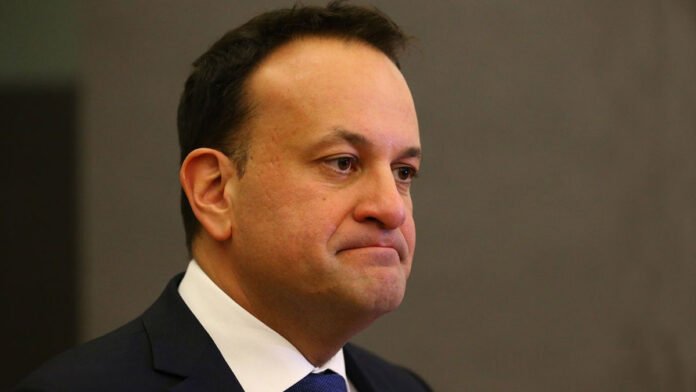The Fall of Varadkar: Ireland’s Rejection of Constitutional Amendments
A solemn peal tolls across the Irish nation as Leo Varadkar’s tenure as Taoiseach draws to an unceremonious close. The proximate catalyst was his government’s resounding repudiation at the ballot box earlier this month, when the people delivered a decisive rejection of the twin referendum proposals to redefine family and care in the constitutional text.
For many, these measures represented an unwelcome attempt to expunge womanhood’s hallowed place in the republic’s foundational charter and absolve the state of its sacrosanct obligations regarding care for the most vulnerable. While the three coalition parties, Sinn Fein, and an array of activist groups marshalled their forces behind the campaign, this elite consensus proved a mere ephemeral mirage when tested against the sovereign will of the Irish people.
The referendum to expand family’s constitutional definition to encompass “durable relationships” like cohabiting couples was soundly defeated by nearly 68% of voters. But it was the proposed amendments concerning care that encountered a literal bloodbath at the polls – with over 73% of the electorate revolting against the proposal to replace the existing language affirming “women in the home” with a more abstract articulation around the “importance of family.” The record referendum defeats indicate voters ‘do not trust the Government’.
Varadkar, ever the self-assured technocrat, likely did not foresee the onrushing maelstrom when he appeared on Virgin Media’s Six O’Clock Show and brashly proclaimed that ensuring care for the aged and vulnerable was “not actually the state’s responsibility…that is very much a family responsibility.” The comments landed like a grenade amidst a populace still harbouring profound reservations about the political class’s devotion to the common good over self-interest.
Varadkar, who said he wanted to remove “very old-fashioned language” in his country’s constitution, said it was clear the amendments were “defeated comprehensively on a respectable turnout”.
Many saw this as an attack on the word ‘Woman’ and ‘Womanhood’ an attempt to remove it from the constitution.
The former Minister for Justice Michael McDowell emerged as perhaps the most articulate voice opposing what he termed “unwise social experimentation” with Ireland’s foundational document. Mustering a litany of legal scholarship, McDowell eviscerated claims that the existing Article 41’s language represented an outdated “stereotyping” of women’s domestic roles. Quite the opposite, he contended – it was an affirmative recognition of the immense value inherent to that vocation.
The former Progressive Democrats leader dismantled one of the central tenets of the Yes campaign – the argument that the present article 41.2 is a “stereotypical reference to women’s place in the home”.
McDowell rejected this as simply “untrue” in a column for The Irish Times, replete with convincing sourcing to back up his argument. He pointed out that former chief justice Susan Denham had previously said “article 41.2 does not assign women to a domestic role”.
“Article 41.2 recognises the significant role played by wives and mothers in the home,” she said:
“This recognition and acknowledgement does not exclude women and mothers from other roles and activities.”
In the aftermath, Varadkar attempted to downplay the defeats as mere “wallops” lacking any deeper significance for the government’s standing. But the scale of rejection encountered at the polls by measures his coalition trumpeted speaks far louder than such disingenuous deflections. Aontú leader Peadar Tóibín pulled no punches, deriding the opposition’s near-total embrace of proposals so clearly out-of-step with the national conscience as “incredible” detachment.
While Varadkar’s exit does not automatically trigger a general election, it marks a pivotal transition for the fragile coalition anchoring Irish governance. As parliament prepares to reconvene after Easter, his party will select a new Taoiseach to navigate this uncharted territory where the people have forcefully reasserted sovereignty over their leaders’ theorised reconstitution of society’s core tenets and obligations.
The personal legacies of being Ireland’s first openly gay premier and youngest ever Taoiseach now yield to a harsher judgment from the vox populi. For in the end, regardless of elite anointing or personal demographic frontiers breached, the ultimate benchmark lies in one’s deference to the nation’s eternal constitutional verity – faithfully articulating and upholding the moral bearings which remain sacrosanct to the Irish Republic’s guiding spirit.
Support Independent Journalism Today
Our unwavering dedication is to provide you with unbiased news, diverse perspectives, and insightful opinions. We're on a mission to ensure that those in positions of power are held accountable for their actions, but we can't do it alone. Labour Heartlands is primarily funded by me, Paul Knaggs, and by the generous contributions of readers like you. Your donations keep us going and help us uphold the principles of independent journalism. Join us in our quest for truth, transparency, and accountability – donate today and be a part of our mission!
Like everyone else, we're facing challenges, and we need your help to stay online and continue providing crucial journalism. Every contribution, no matter how small, goes a long way in helping us thrive. By becoming one of our donors, you become a vital part of our mission to uncover the truth and uphold the values of democracy.
While we maintain our independence from political affiliations, we stand united against corruption, injustice, and the erosion of free speech, truth, and democracy. We believe in the power of accurate information in a democracy, and we consider facts non-negotiable.
Your support, no matter the amount, can make a significant impact. Together, we can make a difference and continue our journey toward a more informed and just society.
Thank you for supporting Labour Heartlands












